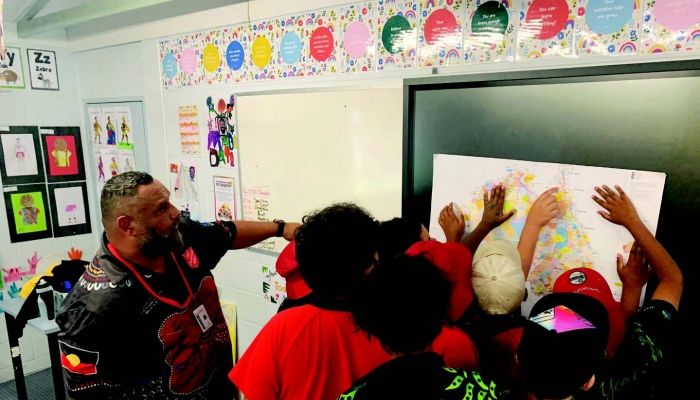Strengthening young lives
24 May 2022

Terrence helps young people connect with their culture and learn their cultural responsibilities.
Mentoring program helps restore cultural connection
Words Naomi Singlehurst
Helping young people grow in confidence and understanding as they connect more deeply with their culture and community is the focus of Terrence Whyte, Aboriginal and Torres Strait Islander Children’s and Youth worker for the Salvos.
As one of a range of initiatives, Terrence and his team created a six-week program of yarning circles and mentoring for young people.
The program uses some elements of the Salvos Positive Lifestyle Program but with an Aboriginal and Torres Strait Islander focus. It explores topics from kinship and moiety to caring for Country.
For a group of enthusiastic Year 6 students from Carinity Education Shalom (school) in Townsville, who have been part of the current program session, the experience will culminate with a cultural visit to Turtle Rock, Hervey Range (40km west of Townsville) on Gudjala Country, led by local Elders.
BUILDING RESILIENCE AND RESPONSIBILITY
Terrence is a Geomulaig man, from the Maluigal nation. His mother comes from the Torres Strait Islands, and he was born and raised on Kalkadoon Country.
“We traditionally had cultural mentors in Aboriginal and Torres Strait Island culture to teach young people their cultural responsibilities to look after Country, to look after each other and to walk the right path in life,” he says.
“While some of this continues today in some places, in other places, it is not at the level it traditionally was, so we are trying in some ways to bring that back for these young people.”
The school groups learn about the significance of the Turtle Rock site on the cultural visit, Terrence explains.
“The boys, who all come from an Aboriginal and Torres Strait Islander heritage, get to engage in some cultural activities,” he says. “They really love knowing there is a cultural site around where they live. We do a smoking ceremony and activities with the local Elders as cultural teachers.
“Getting back to those cultural values and cultural connections, and remembering cultural ceremonies is so important for [Aboriginal and Torres Strait Islander] young people to understand their cultural identity.
It also helps them on the path of caring for Country and caring for people.”
 Terrence Whyte, program creator, is a Geomulaig man from the Maluigal nation.
Terrence Whyte, program creator, is a Geomulaig man from the Maluigal nation.
MULTIFACETED APPROACH
As well as a range of primary school programs, Terrence and the team also run a sports-based leadership resilience program for high school students. It has seen many young people re-engage with school and studies and move into leadership roles.
Terrence also runs the Positive Lifestyle Program, a Salvos course covering self-awareness, anger, depression, loneliness, stress, grief and loss, assertiveness, self-esteem and future direction.
He says teaching about and working for social justice and change is also essential for a healthier future for all.
EVERYONE’S BUSINESS
“This year, the theme for National Reconciliation Week – ‘Be Brave. Make Change’ – really complements the NAIDOC Week 2022 (3-10 July) theme: ‘Get Up! Stand up! Show up!’,” Terrence says.
“The fight for social justice is everyone’s business. These themes are a call to action for everyone because, in 2022, Aboriginal and Torres Strait Islander peoples are still fighting many social injustices to ‘close the gap’ in terms of health, life expectancy, education, incarceration and much more.”
National Reconciliation Week started as the Week of Prayer for Reconciliation in 1993 (the International Year of the World’s Indigenous Peoples) and was supported by Australia’s major faith communities. In 1996, the Council for Aboriginal Reconciliation launched Australia’s first National Reconciliation Week.
Terrence says: “Jesus spoke with and for those who were denied justice in their community. You couldn’t have a better example to follow.”

Comments
No comments yet - be the first.